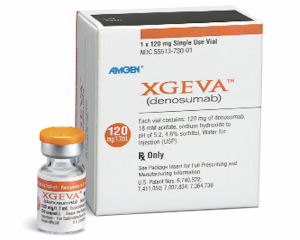From a 194-acre campus in Thousand Oaks, teams of workers at Amgen Inc. spend years, decades even, developing and testing drugs to address cancer and other devastating diseases. The journey to develop Xgeva has taken 15 years. But the biotech giant had a recent breakthrough, which analysts say could help improve the company’s revenue growth. Data from a drug trial show Xgeva, also called denosumab, is the first bone-targeted therapy to delay the spread of cancer to the bone in men with advanced prostate cancer. Results from the trial, which began in February 2006, were presented for the first time at the American Urological Association’s annual meeting held last month in Washington D.C. In December, the U.S. Food and Drug Administration approved the drug as a method for preventing fractures and other bone complications in certain cancer patients. The newly-presented data is extremely significant for Amgen, a company that has been a story of “managing decline,” said analyst Christopher Raymond of Baird & Co. “This is a launch that has massive potential in terms of revenue and growth,” Raymond said. Founded in 1980, Amgen is the world’s largest biotech company, with sales totaling $15 billion last year. It employs 17,000 employees worldwide, including about 6,700 workers at its headquarters in Thousand Oaks. Until Xgeva hit the market, Amgen was under a lot of pressure, Raymond said. The company’s quarterly revenue growth on a year-over-year basis has trailed that of direct competitors such as Johnson & Johnson, Novartis AG and Sanofi-Aventis. Sales of Amgen’s once-popular anemia drugs have waned, and the company’s stock price has seen inconsistent fluctuations. First-quarter 2011 GAAP net income was $1.1 million, a 4 percent decrease from about $1.2 million in the first quarter last year. Total first-quarter revenue increased 3 percent to $3.7 million, compared to about $3.6 million in the year-ago period. For the full year 2010, Amgen’s reported GAAP net income was about $4.63 billion, versus about $4.61 billion for the full year 2009. Revenues rose 3 percent from $14.6 billion in 2009. Looking ahead Chairman and CEO Kevin Sharer told analysts in January that making Xgeva a success is a priority for Amgen as it looks to increase profitability and build shareholder value. The drug appears to be on pace with the company’s target. “Xgeva is off to a strong start,” Sharer said, in the first-quarter conference call. By 2015, analysts, on average, have forecast annual Xgeva sales of $2.5 billion. Company officials and analysts say the results of the trial were significant because they raised the drug’s profile in market. The data showed Xgeva added 4.2 months to the amount of time patients survived without the cancer spreading to the bone, compared with patients who received placebo, a substance containing no medication. Overall survival, however, was similar between patients who received Xgeva and those who received placebo, the company said. The trial involved 1,432 men with advanced prostate cancer. A couple of factors make Xgeva attractive to patients with advanced prostate cancer, said Dr. Roy Baynes, Amgen’s vice president of global development. First, it does not have to be given intravenously. And unlike other competing drugs in the market, there are no related flu-like symptoms known to occur, Baynes said. Potential side effects include the development of hypocalcaemia, a condition where there is too little calcium in the blood, and osteonecrosis of the jaw or death of jawbone tissue. The drug’s journey is far from over. The FDA is considering the results of the trial for another approval, which would make Xgeva the first therapy to delay the spread of cancer to the bone in prostate cancer patients. There’s no telling how long that could take, said Baynes. Including Xgeva, 10 of Amgen’s products are already on the market. More than 40 drugs are in clinical trials.
